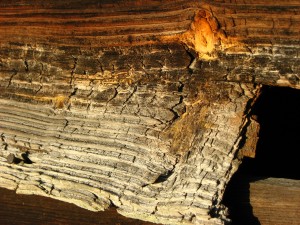
Lamentations 3: 1-9, 19-24
I am one who has seen affliction under the rod of God’s wrath; he has driven and brought me into darkness without any light; against me alone he turns his hand, again and again, all day long. He has made my flesh and my skin waste away, and broken my bones; he has besieged and enveloped me with bitterness and tribulation; he has made me sit in darkness like the dead of long ago. He has walled me about so that I cannot escape; he has put heavy chains on me; though I call and cry for help, he shuts out my prayer; he has blocked my ways with hewn stones, he has made my paths crooked…The thought of my affliction and my homelessness is wormwood and gall! My soul continually thinks of it and is bowed down within me. But this I call to mind, and therefore I have hope: The steadfast love of the LORD never ceases, his mercies never come to an end; they are new every morning; great is your faithfulness. “The LORD is my portion,” says my soul, “therefore I will hope in him.”
I once visited friends in Sweden over Easter weekend. As we walked through Stockholm on Good Friday, the church bells rang and I asked what name they have for Good Friday. My friend’s boyfriend, not quite as good at English as she was, insisted on being the one to tell me. He said, proudly, “We call it ‘Tall Friday.’” As we continued walking and I mused about why the Swedish would call it that, my friends conferred in Swedish and then he said, sheepishly, “Long. We call it ‘Long Friday.’” Apparently the word for “tall” and “long” is the same in Swedish and he picked the wrong English word on his first try.
“Long” makes sense. Particularly from the perspective of Friday or Saturday, very long days when Easter has not yet revealed its life-giving, life-changing surprise. “Long” makes sense and it’s easy to feel the pain and confusion of Lamentations in this long, slow, sad time of Holy Week. It’s easy to think that God “has made me sit in darkness like the dead of long ago…walled me about so that I cannot escape…put heavy chains on me…[and] though I call and cry for help, [God] shuts out my prayer…”
What I love about this passage is that it is full out lamenting. This is a wail of a prayer and you can feel how deserted the writer feels. It gives us permission to feel this way, too. It shows us that for many, many generations there have been times when God’s people have felt completely forsaken. By its existence in the canon of scripture and by its own words, it gives us permission to feel and express the real, gritty, needy aspects of our humanity. It’s OK, in the depths of Good Friday and Holy Saturday or in the midst of the low and grief-stricken periods of our own lives, to say it. It’s OK to cry out and ask where God is and why it hurts so much.
I also love that, right alongside this wail of a prayer, is the firm conviction that no matter how it looks or feels right now, God is here, watching out for us. “But this I call to mind, and therefore I have hope: The steadfast love of the LORD never ceases, [God’s] mercies never come to an end; they are new every morning; great is your faithfulness. “ We don’t have to feel that or fully believe it just yet. It’s enough to know that for many, many generations God’s people have affirmed that God’s love is indeed steadfast, that God is full of mercy, and that this is the basis of our hope. It’s enough to rest in the collective hope of our faithful ancestors, especially when the day is long and we are besieged.
God in the silence, I call to you. God in the darkness, I look for your light. Waiting is not easy but I know you wait with me. Give me perseverance when I feel like quitting and hope when I feel defeated. It’s a long time from Friday to Sunday but I have hope you will meet me in the morning. Amen.
